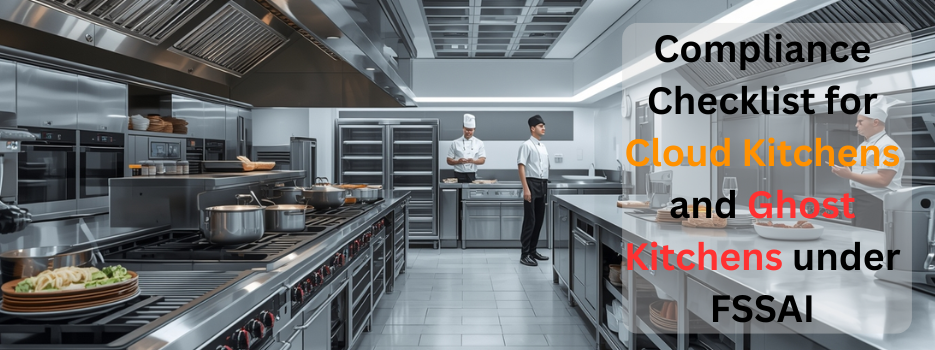Since the food delivery apps such as Zomato and Swiggy were established, the population of the cloud kitchens has increased a lot. For many individuals, these platforms have become an income source. With no traditional dining area, the owners of cloud and ghost kitchen businesses concentrate on preparing the food for delivery or takeout. Like the offline food delivery or restaurants, the FSSAI has set the regulations for cloud-based kitchens. Cloud and ghost kitchens are required to register their food with the Food Safety and Standards Authority of India (FSSAI). Let’s explore the guide to know what compliance checklist has been set for the cloud kitchens and the requirements of the FSSAI food license.
1. What are Cloud Kitchens and Ghost Kitchens?
There is no difference between the cloud and ghost kitchens; they are essentially the same. They work as restaurant-style businesses focused solely on preparing food for delivery, with no traditional dining area. The word is used for the commercial servers who deliver the online food by using their own apps or third-party apps such as Zomato or Swiggy. Such types of food delivery operate with lower overhead costs by avoiding the extra expenses of a storefront and seating.
2. What is the Compliance Checklist for Commercial Kitchens?
Under the FSSAI Act 2006, the FSSAI registration is essential for cloud kitchens. They are also subject to maintaining the food quality and safety standards, including hygiene parameters. On the other hand, the compliance checklist includes securing a valid license, gathering important documents, and making the right kitchen layout plan. This can be understood as
Mandatory FSSAI License and Documentation
- Get the right FSSAI license: There are three types of FSSAI food licenses: Basic, State, and Central. Must choose it based on your annual turnover.
- Provide Supported Documents: Multiple documents are required during the FSSAI license registration, such as
- Identity and address proof for the owner.
- Proof of business premises address (e.g., rental agreement).
- Kitchen layout plan.
- A signed FSSAI declaration form (Form B).
- Water quality test report from an NABL-approved lab.
- List of all food products to be prepared.
- Business registration documents (if applicable, e.g., partnership deed, GST certificate)
- Display License and Renewal: After securing the food registration license, the cloud kitchen owner displays it at their premises. In addition, the license is valid for a specific timeline; you must apply for renewal to avoid penalties.
Maintenance of the facility and Hygiene
- Kitchen Infrastructure: A proper design of the kitchen is crucial to avoid dust or pests from entering the place. Using non-toxic materials can be helpful.
- Water Supply: Must have the facility of cold and hot water for us during the food preparation procedure.
- Hygiene: Maintain a robust facility for hygiene. Implement the commercial-grade cleaning and sanitization process.
- Waste Disposal: Build a proper facility for the food waste disposal.
Staff and Training Management
- Staff Training: Provide the training to the staff, and they must be aware of the food safety and hygiene protocols.
- FoSTaC Training: The staff of the cloud kitchen must hold a valid training experience from the Food Safety and Standards Authority of India’s training program, FoSTaC.
- Hygiene Protocols: The staff must wash their hands accurately and wear caps during food preparation. Conduct the medical checks for all staff.
Labeling and Records Requirements
- Product Labeling: The food product package must label the important information, such as used ingredients, logos, expiry date, and much more.
- Record-Keeping: Maintenance of the detailed information of the purchases, production, and pest control is vital.
3. Sum Up | Maintenance of the Food for Safety and Quality
To avoid food-borne diseases, proper management of food safety and quality parameters is essential. High-quality food not only builds trust with consumers but also enhances the brand and presents well to FSSAI (Food Safety and Standards Authority of India). The FoSCoS registration ensures that cloud-based kitchens meet all compliance checklists. To stay in compliance with the FSAAI Act, one must meet the hygiene and safety requirements. Train all staff regarding food safety protocols. Take a wise step by applying for the food license or seeking an FSSAI license consultant to streamline the registration procedure.
Frequently Asked Questions
1. Is an FSSAI license mandatory for the cloud-based kitchens?
Ans. Yes, registering with the FSSAI authority for the food license is compulsory if you are operating in India. The license is necessary to comply with national and international food safety laws and standards.
2. Is GST registration compulsory for the cloud kitchen?
Ans. If the turnover of the cloud kitchen exceeds a specific threshold, the GST registration is compulsory. Even, it is also required during the selling of food via Zomato or Swiggy.
3. How to apply for the FSAAI food license?
Ans. For the FSSAI registration, you must use the FoSCoS online portal. Contact a legal consultant for faster and hassle-free registration.
4. Which application form is required for registration?
Ans. If you are applying for the food license, use Form A; otherwise, use Form B for the registration.
5. Can you apply for the food license online?
Ans. Yes, the FSSAI licensing process is completely turned digital. FoSCoS is the single window for license applications.

